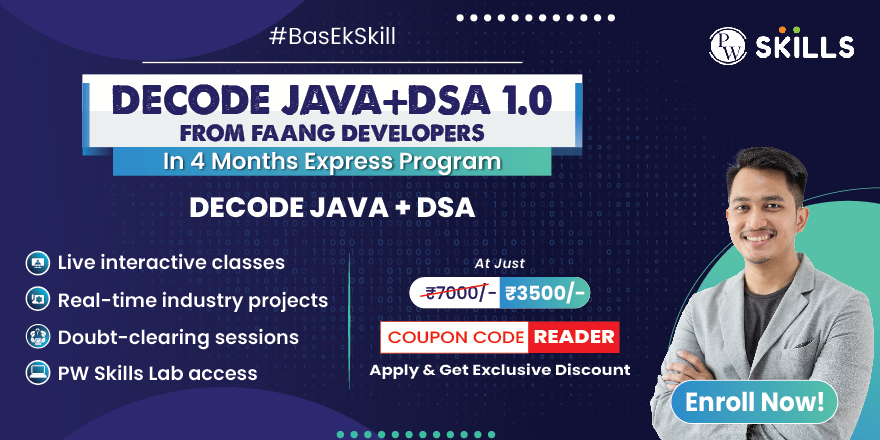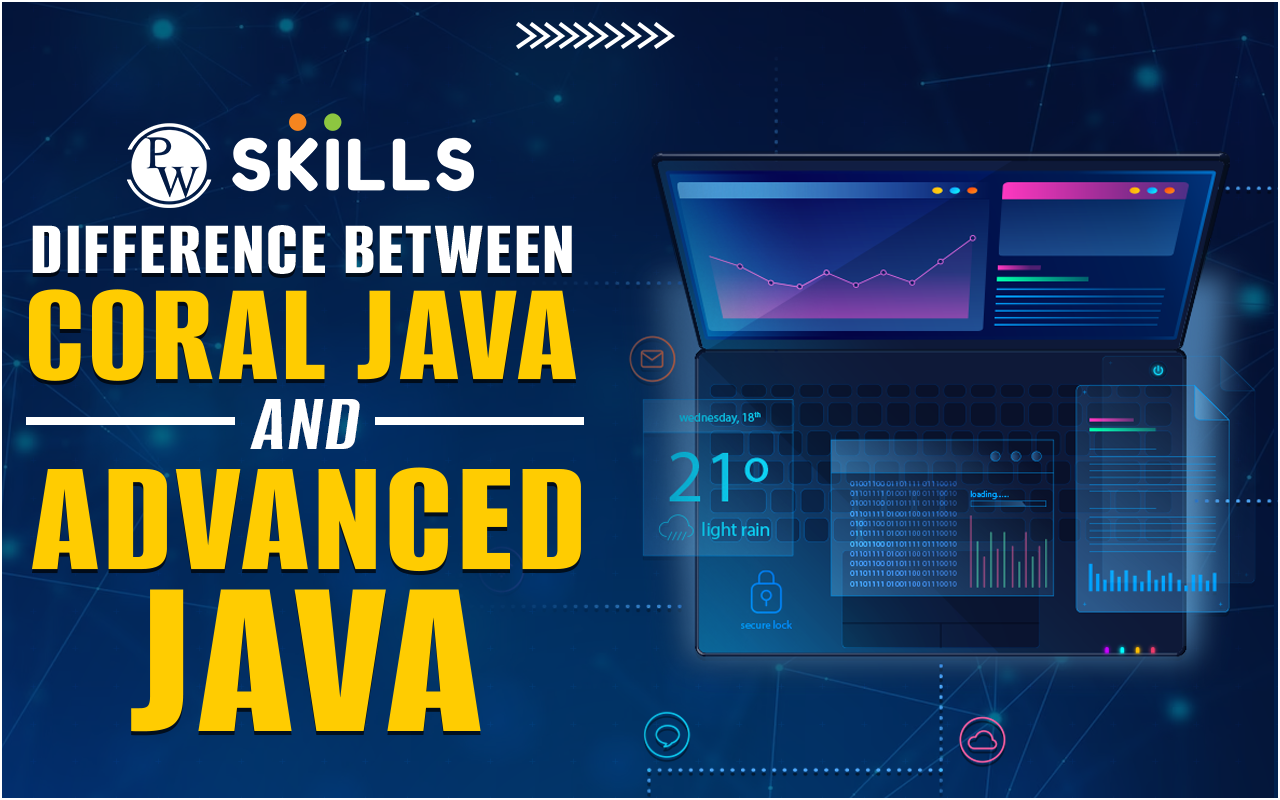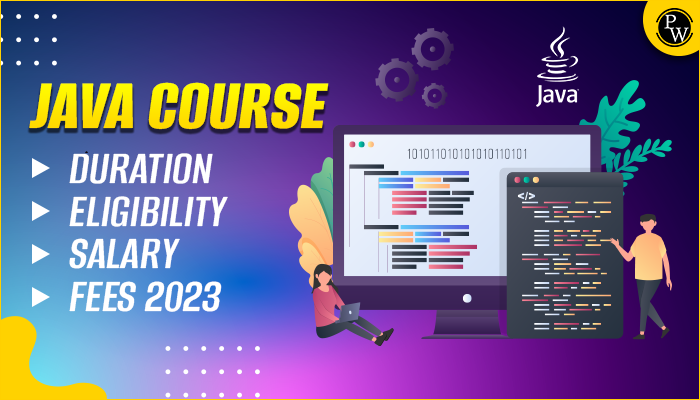Java is a versatile and widely used programming language. It has evolved a lot over the years, branching into specialised domains known as Core Java and Advanced Java. With that, many people are confused between Java or advanced Java.
So, in this blog, we’ll discuss which one should you go for between Java or Advanced Java, their features, use cases, and the perennial question: Which is better?
Kickstart your journey to becoming a sought-after web developer with Decode Java+DSA 1.0 from Physics Wallah. This comprehensive program equips you with the essential skills and hands-on experience to tackle real-world development challenges. So, don’t wait! Enrol now and transform your career!
What is Core Java?

Core Java forms the bedrock of the Java programming language, providing fundamental features for versatile programming. It simplifies application and applet development with essential building blocks. Core Java prioritises simplicity and portability. It highlights platform independence and offers a strong set of APIs. Key aspects encompass object-oriented programming and essential packages such as java.lang, java.util, and java.io, pivotal for numerous Java applications. Applied across diverse scenarios, Core Java is the preferred choice for developers seeking simplicity and user-friendly development. Its adaptability shines in various applications, ranging from standalone desktop to mobile applications using JavaFX. It plays a central role in web development, evident in technologies like Servlets and JSP (JavaServer Pages).
What is Advanced Java?
Advanced Java, as the name suggests, extends the capabilities of Core Java. It comprises advanced technologies and APIs that cater to specific requirements in enterprise-level applications. While Core Java forms the foundation, Advanced Java adds layers of complexity to address the challenges of larger-scale, more intricate projects.
Advanced Java introduces features such as Servlets, JSP, JDBC (Java Database Connectivity), and Enterprise JavaBeans (EJB). Servlets and JSP facilitate the development of dynamic web pages, while JDBC enables Java applications to interact with databases. EJB, on the other hand, provides a component-based architecture for enterprise-level applications.
Advanced Java excels in business settings prioritising scalability, security, and transaction management. It underpins various expansive applications such as e-commerce platforms, banking systems, and customer relationship management (CRM) solutions. The resilience and scalability of Advanced Java render it apt for high-performance, reliable applications.
Also read: 11 Best Advanced Java Projects for Beginners | PW Skills
Java vs. Advanced Java vs. Core Java
Java, Advanced Java, and Core Java delineate diverse strata of the Java programming language, each fulfilling unique roles. For a more profound comprehension, let’s explore distinctive features and functions that differentiate them.
1. Java
Java, as the foundational layer, provides the fundamental elements for programming in the Java language. It is renowned for its platform independence, achieved through the “Write Once, Run Anywhere” (WORA) philosophy. Here are some key features:
- Portability: Java code can run on any device or platform with the Java Virtual Machine (JVM), allowing developers to write code without worrying about platform-specific details.
- Object-Oriented Programming (OOP): Java follows the principles of OOP, promoting modularity, reusability, and flexibility in software design.
- Standard Libraries: Java includes a comprehensive set of standard libraries in packages like java.lang, java.util, and java.io. These libraries provide essential functionalities for string manipulation, data structures, and input/output operations.
2. Core Java
Core Java builds upon the foundation laid by Java, enriching the language with additional features and functionalities. It serves as the base for various application types, from desktop to mobile. Key aspects of Core Java include:
- Swing and AWT: Core Java introduces Swing and Abstract Window Toolkit (AWT) for creating graphical user interfaces (GUIs). Swing, being more modern, is often preferred for its flexibility and look-and-feel customization.
- Networking: Core Java facilitates network programming through packages like java.net, allowing developers to create applications that communicate over the internet.
- Multithreading: Core Java supports multithreading, enabling the concurrent execution of multiple threads within a single program. This is crucial for optimising performance in applications that perform parallel tasks.
3. Advanced Java: Scaling for Enterprise Solutions
Advanced Java, the upper echelon, extends the capabilities of Core Java to meet the demands of enterprise-level applications. It introduces technologies and frameworks specifically designed for complex scenarios. Here are some distinguishing features:
- Servlets and JSP: Java Servlets and JavaServer Pages (JSP) form the backbone of web applications. Servlets handle server-side logic, while JSP allows developers to embed Java code within HTML, facilitating dynamic content generation.
- JDBC (Java Database Connectivity): Advanced Java includes JDBC, a powerful API for connecting Java applications to databases. This enables seamless interaction with relational databases, a crucial feature for enterprise systems.
- Enterprise JavaBeans (EJB): EJB provides a component-based architecture for building scalable, distributed, and transactional enterprise applications. It simplifies the development of complex systems by managing aspects like security, transaction management, and persistence.
- Spring Framework: While not part of the Java standard library, the Spring Framework is widely used in Advanced Java development. It offers a comprehensive infrastructure for enterprise Java development, addressing concerns like dependency injection, aspect-oriented programming, and more.
Performance Differences and Optimization Considerations
Java: Streamlined and Efficient
Java, being the foundational layer, is often more streamlined and efficient in terms of performance. Its simplicity and emphasis on platform independence make it suitable for a wide range of applications, especially those where advanced features are unnecessary.
Core Java: Balancing Simplicity and Functionality
Core Java retains the efficiency of Java while introducing additional features. The performance impact is generally minimal, and the benefits of enhanced functionality outweigh any marginal differences in speed. For smaller to medium-sized applications, Core Java strikes a balance between simplicity and functionality.
Advanced Java: Optimal Performance in Complex Scenarios
Advanced Java, catering to complex enterprise scenarios, may introduce some performance overhead due to its extensive features. However, when these features are optimally utilised, Advanced Java can outperform its counterparts in situations that demand distributed computing, database interactions, and intricate transaction management.
Key Differences Between Java and Advanced Java
The primary distinction lies in the level of complexity and the features offered. Java provides a general-purpose platform, suitable for a wide range of applications. Core Java adds essential components, making it more feature-rich. Advanced Java, with its enterprise-level features, caters to complex applications that demand distributed computing, database interactions, and dynamic content generation.
Development Process
The development process in Core Java is often faster and simpler, making it ideal for rapid application development. Advanced Java, with its focus on enterprise-level applications, may involve a more extended development lifecycle due to the incorporation of additional features and the need for meticulous testing.
Compatibility
Both Java and Advanced Java benefit from a vast community and extensive documentation. However, Core Java may enjoy broader compatibility due to its lightweight nature. Advanced Java, being more specialised, may require specific environments or configurations, but it compensates with enhanced support for enterprise-level features.
Also read: Multithreading in Java
Core Java or Advanced Java: Which is Better for You?
For developers, the choice between Core Java and Advanced Java is crucial, depending on project needs, scalability, and the complexities of application development. Exploring the factors influencing this decision can assist in determining which variant aligns more effectively with your objectives.
Factors to Consider Based on Project Requirements
- Project Scope and Complexity:
-
-
- Core Java: Ideal for projects with simpler requirements and a limited scope. If your project involves basic desktop applications, simple utilities, or educational purposes, Core Java may be the better fit.
- Advanced Java: Suited for complex projects with extensive requirements, such as large-scale enterprise applications. If your project involves distributed computing, database interactions, and intricate business logic, Advanced Java becomes a more compelling choice.
-
- Application Type:
-
-
- Core Java: Well-suited for standalone applications, utilities, and smaller-scale projects. It provides a solid foundation for general-purpose programming and learning the basics of Java.
- Advanced Java: Essential for web-based applications, especially those requiring dynamic content generation, database connectivity, and transaction management. If your project involves building robust web applications or enterprise solutions, Advanced Java is more appropriate.
-
- Performance Considerations:
-
- Core Java: Generally offers better performance in scenarios where advanced features are unnecessary. If your project prioritises speed and efficiency over advanced functionalities, Core Java is a more lightweight and streamlined option.
- Advanced Java: Introduces some performance overhead due to its additional features. However, when these features are optimally utilised, Advanced Java can deliver optimal performance in complex, enterprise-level scenarios.
Skills and Learning Curve for Each
- Learning Curve:
-
-
- Core Java: The learning curve for Core Java is generally less steep, making it accessible to beginners. It serves as an excellent starting point for those new to programming or transitioning from other languages.
- Advanced Java: Requires a deeper understanding of concepts such as servlets, JSP, JDBC, and enterprise-level architecture. Developers looking to delve into Advanced Java should have a solid foundation in Core Java and be prepared for a more comprehensive learning curve.
-
- Developer Expertise:
-
- Core Java: Ideal for developers who prioritise simplicity, versatility, and a quicker development cycle. It’s a good fit for those focusing on foundational programming concepts without delving into the complexities of enterprise-level development.
- Advanced Java: Suited for developers seeking to work on large-scale, enterprise applications. If you aim to specialise in web development, database connectivity, and complex transaction management, gaining expertise in Advanced Java is essential.
Future Trends and Relevance of Core and Advanced Java
- Core Java:
-
-
- Relevance: Core Java remains highly relevant as a foundational programming language. It continues to be a crucial stepping stone for beginners and serves as the basis for more advanced Java technologies.
- Future Trends: While newer languages and frameworks emerge, Core Java’s principles and concepts persist. It provides a stable foundation for learning programming that can be applied across various domains.
-
- Advanced Java:
-
- Relevance: Advanced Java, with its focus on enterprise-level applications, maintains relevance in industries demanding scalability, security, and complex business logic.
- Future Trends: As the demand for robust web applications and enterprise solutions grows, technologies within the Advanced Java ecosystem, such as Spring Framework, continue to be widely adopted. Staying updated on these trends is crucial for developers in this domain.
Also check: Top 15 Java Projects With Source Code [2024]
Conclusion
The choice between Core Java and Advanced Java boils down to the specific needs of the project at hand. Core Java offers simplicity and versatility, while Advanced Java provides the depth and complexity required for enterprise-level applications. Understanding the differences and assessing project requirements will empower developers to make informed choices in the dynamic landscape of Java programming. As technology continues to evolve, both Core Java and Advanced Java will likely retain their significance, offering developers a rich ecosystem to explore and leverage in their endeavours.
FAQs
Is Core Java sufficient for web development?
While Core Java provides a solid foundation for programming, it may not be sufficient for extensive web development. Advanced Java technologies like Servlets and JSP are designed specifically for building dynamic web applications, making them more suitable for such projects.
Can I transition from Core Java to Advanced Java easily?
Yes, transitioning from Core Java to Advanced Java is a natural progression. Having a strong understanding of Core Java concepts is essential before delving into Advanced Java, where you'll encounter technologies like Servlets, JSP, and JDBC.
Which Java variant is more suitable for mobile app development?
Core Java is commonly used for mobile app development, especially for Android applications. While Advanced Java may offer additional features, Core Java's simplicity and compatibility with Android make it a preferred choice for mobile development.
Are there situations where neither Core Java nor Advanced Java is suitable?
Yes, for highly specialised scenarios or when working with emerging technologies, neither Core Java nor Advanced Java might be the best fit. In such cases, exploring newer languages or frameworks might be more appropriate.
Is it possible to use Advanced Java features in a Core Java project?
Generally, Core Java and Advanced Java features are distinct, with Advanced Java building upon Core Java. While you can integrate certain features, such as JDBC for database connectivity, attempting to use Advanced Java technologies in a Core Java project may lead to complications and is not recommended.



